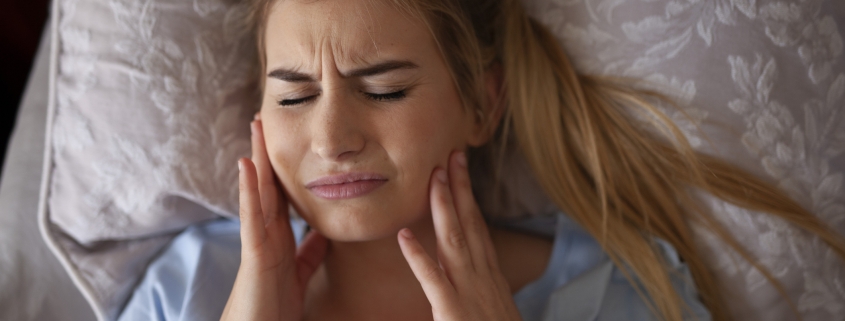Effects of Teeth Grinding
Left untreated, bruxism can have several long-term effects on dental and overall health:
1. Tooth Damage
The most obvious consequence of teeth grinding is the physical damage to teeth. Over time, the constant grinding can wear down enamel, leading to increased sensitivity, cavities, and tooth fractures. Severe bruxism may also cause teeth to become loose or shift.
2. Temporomandibular Joint (TMJ) Disorders
Bruxism can strain the jaw muscles and joints, leading to temporomandibular joint (TMJ) disorders. Symptoms include pain when opening or closing the mouth, difficulty chewing, and even a clicking or popping sound in the jaw.
3. Facial Pain
Chronic bruxism can cause tension in the facial muscles, leading to soreness or pain that can radiate to other areas, such as the neck, shoulders, and head.
4. Sleep Disruption
Sleep bruxism often disrupts the quality of sleep, both for the individual grinding their teeth and for their sleeping partner. This can lead to fatigue, irritability, and difficulty concentrating during the day.
Diagnosing Teeth Grinding
Teeth grinding is often identified by a dentist during a routine dental exam. Dentists can look for signs of worn teeth, ask about jaw pain, and even evaluate whether the jaw muscles are overdeveloped due to clenching.
For sleep bruxism, a dentist or physician may recommend a sleep study (polysomnography), which monitors sleep patterns, breathing, and other indicators to determine whether grinding occurs during sleep and to rule out related conditions like sleep apnea.
Treatment for Teeth Grinding
While there is no cure for bruxism, there are several treatments available to manage the symptoms and prevent further damage:
1. Mouthguards or Splints
Custom-fitted mouthguards or splints are one of the most effective treatments for bruxism. Worn during sleep, they help cushion the teeth and prevent them from grinding against each other. These devices also help alleviate pressure on the jaw muscles and reduce damage to the teeth.
2. Stress Management
Since stress and anxiety are common triggers for teeth grinding, managing emotional stress is an essential part of treatment. Techniques like mindfulness meditation, cognitive-behavioral therapy (CBT), and relaxation exercises can help reduce stress levels and prevent daytime bruxism.
3. Correcting Tooth Alignment
If malocclusion is contributing to bruxism, orthodontic treatments such as braces or clear aligners may be recommended to align the teeth properly and reduce grinding.
4. Medications
In some cases, doctors may prescribe muscle relaxants or medications to reduce jaw muscle activity during sleep. However, these are usually short-term solutions, as medications may have side effects.
5. Lifestyle Changes
Modifying certain habits can reduce the frequency of bruxism. These include:
- Reducing caffeine and alcohol intake, especially in the evening
- Avoiding chewing gum, as it can overwork the jaw muscles
- Quitting smoking
Preventing Teeth Grinding
To prevent teeth grinding or manage its symptoms effectively, here are some useful strategies:
- Regular Dental Visits: Seeing a dentist regularly can help catch the signs of bruxism early and prevent further damage to the teeth.
- Relaxation Techniques: Incorporating relaxation techniques, such as deep breathing, yoga, or muscle relaxation exercises, can help reduce stress and tension.
- Sleep Hygiene: Improving sleep hygiene by establishing a regular bedtime routine, reducing screen time before bed, and creating a calming sleep environment can reduce the likelihood of sleep bruxism.
- Jaw Exercises: Physical therapy or jaw exercises recommended by a healthcare provider can help strengthen and relax the muscles around the jaw.

